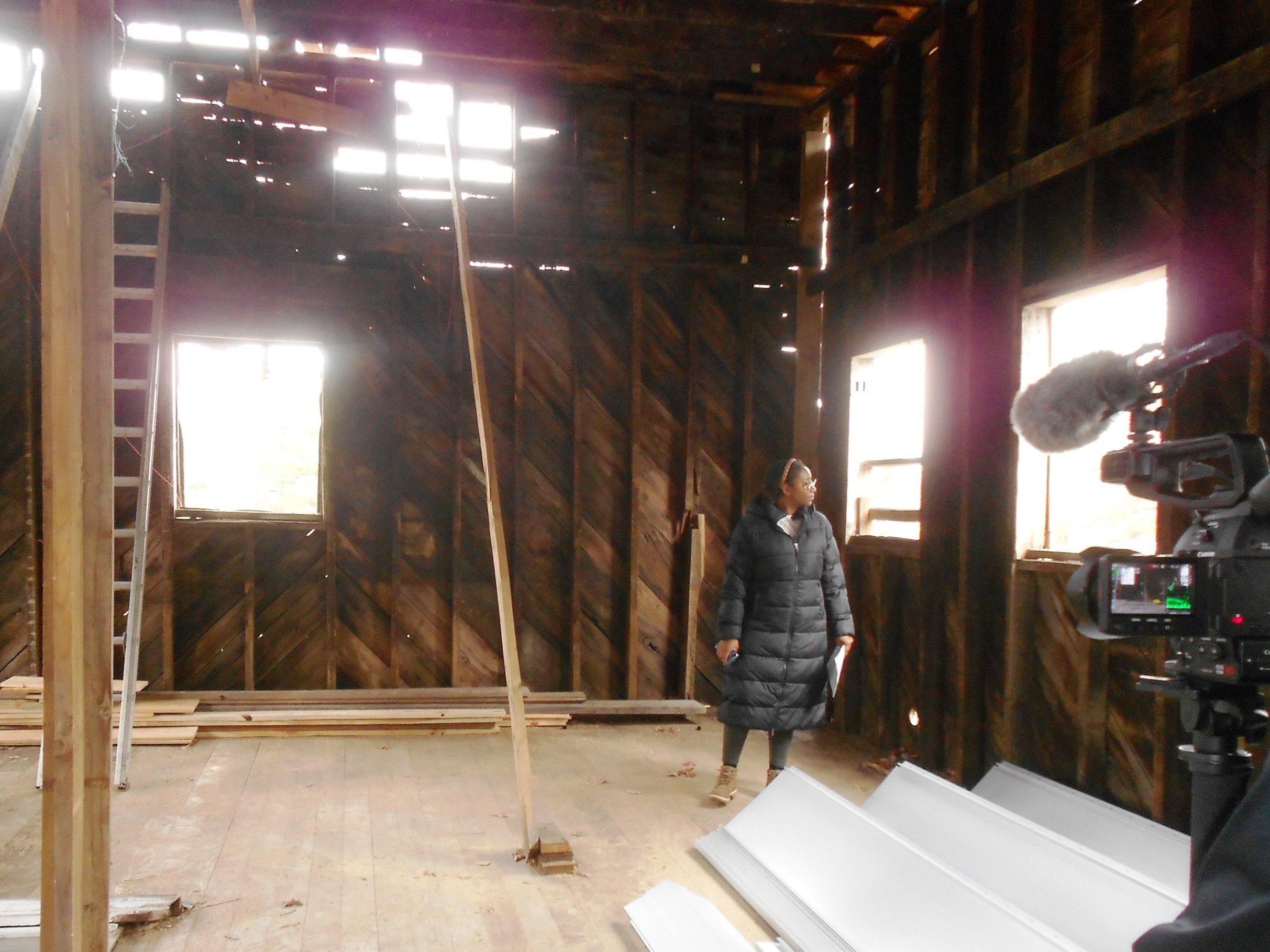MHT Sees Bethel Center Progress
Pictured left to right: Mountain Lake Park Town Council member and MLPHA Treasurer, Linda Fike, MLPHA President, Karen Wooddell, MHT Taylor Means Research and Preservationist Specialist, MHT Stacy Montgomery Capital Programs Administrator, and Mountain Lake Park Mayor, Don Sincell. Photo courtesy of Mark Stutzman.
Standing rustic and regal, Bethel Center continues to undergo an extensive restoration. Two representatives from the Maryland Historical Trust (MHT) made a site visit to examine the progress of the Bethel African Methodist Episcopal (A.M.E.) Church reconstruction project. In just a few months, the interior floor, walls, and roof were up, giving the building a solid presence at its new home in Mountain Lake Park. Originally located at the corner of 5th and High Streets in Oakland, MD, the church’s congregation opened its doors in 1900 and was an African-American sanctuary for three decades. It was repurposed and moved in the 1930s to serve as a buggy and blacksmith’s shop on an Amish farm in Pleasant Valley. Fortunately, the family who used it daily kept the building intact for nearly one hundred years. What will be called Bethel Center, the only African-American church to exist in Garrett County has found a final location for future generations to learn about the contributions of a population that had been forgotten over time.
A local history chronicler, Albert “Al” Feldstein took interest in the A.M.E. Church many years ago. He frequently posts historical points of interest in Western Maryland on his Facebook page Feldstein’s Historical Stuff. He was present at the site visit and made sure MHT was aware that officials in the town of Oakland took steps to reacquire the building. They engaged a specialized architect to assess the church’s integrity and outline what would need to be done to properly restore it. Unfortunately, the proposed plans never made it to fruition. Years after the debunked attempt to relocate the church, former Oakland resident Kate Smith reignited interest by researching and archiving African-American families who once lived in the town where she served as a council member at the time.
"This is an effort that has been ten years in the making,” Al said emphatically. “But it finally took a group of determined people like the Mountain Lake Park Historical Association, the town, and others to make it a reality."
It required even more than sheer determination since the deconstruction of the church, moving it, and reassembly would come with a significant cost. As part of an African-American Heritage Preservation Program (AAHPP) grant, MHT awarded $100,000 toward the relocation and reconstruction work. Without proper funding, the church would have fallen into further ruin and possibly have been lost. The site visit included two representatives from MHT, Stacy Montgomery a Capital Programs Administrator, and Taylor Means, a Research and Preservationist Specialist. Mayor Don Sincell who initiated the project and has taken on procuring contractors explained the steps up to the point of their inspection. Both representatives were glad to see how much had already been accomplished and noted that this was the first AAHPP grant application awarded in Garrett County.
Although Bethel Center will not become an active congregation, it will be a public space for learning about local African-American history and be available for events or special services. Sincell provided an overview of how the church originally served parishioners and how it will benefit people today.
“I would like to see this become an annual field trip for children in the county,” said Sincell. “This building represents an important part of the local history of which many people here are unaware. And if someone wants to have a wedding, baptism, or memorial service in the church, it would be a special place to do so.”
African-American history for Garrett County was largely lost following the decline of railroad travelers visiting the mountaintop into the 1930s. With a lack of employment opportunities in the service industries, many people left for places like Westernport where the paper mill was a lead employer, and Cumberland where factories were still booming. The minority population in Garrett County around the turn of the last century is being rediscovered through extensive research. Cooperation with the Garrett County Historical Society and independent researchers are revealing African-American residents who not only helped prop up the local economy but also married, began families, and were buried in local cemeteries. The goal of resurrecting a heritage destination and uncovering forgotten people will enhance the tapestry of local history, according to volunteers dedicated to the project. A future hope of those involved in Bethel Center is to develop a heritage pilgrimage tour to learn about African-American people who once lived, worked, and contributed to the development of Garrett County.
Tracy and Taylor examine the building’s exterior. Photo courtesy of Albert Feldstein
Taylor stands next the standing seam roof material soon to be installed. Photo courtesy of Albert Feldstein



